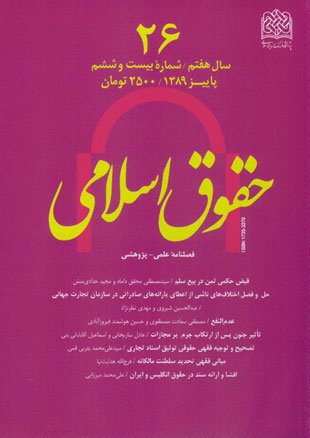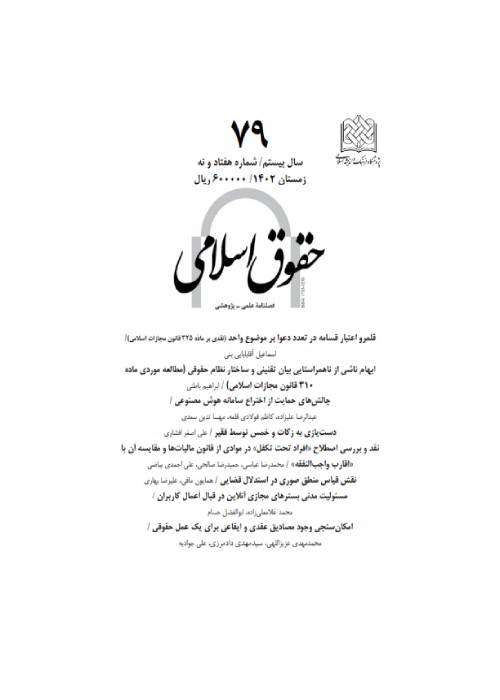فهرست مطالب

فصلنامه حقوق اسلامی
سال هفتم شماره 3 (پیاپی 26، پاییز 1389)
- 206 صفحه، بهای روی جلد: 25,000ريال
- تاریخ انتشار: 1389/09/16
- تعداد عناوین: 7
-
-
صفحه 7
-
صفحه 59
-
صفحه 137
-
Page 7Taking possession of price is one of the elements of forward sale; and,according to most jurists, it should be done before separation between two parties takes place. If price is present in cash or in the form of some certain property, it is easy to think of taking possession or not taking possession. In the contemporary commercial relationships, however, this is not usually the case; and this very stipulation may be an obstacle to many transactions.The present writing is to discuss other ways of taking possession so that transactions made as forward sale may not be nullified in respect to taking possession or not taking possession without some reasonable evidence. According to "warrant taking possession", the buyer may, to pay the price, calculate the price out of his due credit with the seller, or he may introduce a guarantee; and, in this case, when the bill or guarantee is realized before separation, taking possession will be realized,even if it is paid in installments. Also, other documents such as cheques,notes, and bills may be used; such cases are not considered as taking possession. To make a new contract such as the debt contract between two parties is not the same as change in the origin of bligation or taking possession. Sometimes also, when conditions are realized, setoff will replace taking possession. Price which should be paid in future may be changed, but the new price should be taken.Keywords: advance money, warrant taking possession, price, sale of debt for debt, novation, setoff
-
Page 29To extend the range of their exports and enter the international markets, most countries have taken granting of export subsidies as a part of their economic policies. In liberal trade, granting of export subsidies is considered as an unfair act disturbing international commercial relations,causing damages, and negatively influencing other countrie's domestic interests or export market. The World Trade Organization which is founded on commercial freedom and fair competition controls export subsidies, prohibits some of them, and maintains that some others may be counteracted and prosecuted. Because of increase in granting of export subsidies by governments, which has led to increase in legal debates between countries, solving debates resulted from granting of export subsidies as well as the process in which such cases are investigated is of paramount importance.In the present article, the process of solving debates resulted from export subsidies, sanctions and requirements of verdicts issued by the World Trade Organization will be discussed.Keywords: World Trade Organization, GOT, Subsidies Agreement, Compensative Measures, export subsidies
-
Page 59There are some differences in opinions concerning possessory value of profits and considering loss of anticipatory profit as a true loss; and,perhaps because of these very differences, conflicts are seen in opinions stated by the legislator. Since, in the convention and customary law,profits are taken as having some possessory value, it seems that, based on the more correct juridical rule of "Sic Utere Tuo Ut Alienum Non Laedas" as well as the certain tradition of the wise, loss of anticipatory profit may be deemed as certain loss. It may be thought that laws according to which loss of anticipatory profit is not guaranteed and demandable are referring to the losses of anticipatory profit which may be acquired; those laws which take it as being demandable, however, are referring to losses of anticipatory profit which may be certainly acquired.Keywords: loss of anticipatory profit, loss, the rule of
-
Page 89In jurisprudence as well as in Penal Law, insanity while a crime is committed, eliminates responsibility; but when insanity occurs after committing a crime for which a verdict has been issued, a question arises:"may punishments be imposed on this person or not?"In the present Penal Act as well as in the Amendment to it, in respects to hudud (religious punishments) and retaliation as well as bodily punishments, if punishment may be of influence, the insane is punishable.In jurisprudence, we have other ideas as well; and taking into account such ideas, the legislator may make proper correction to the Act; in particular based on the fact that the well-known idea [referred to in the Penal Act] is founded on an isolated haidth; and in important penal issues, referring to isolated hadiths as well as issuing some verdict in accord to that hadith is faced by serious challenges. Also, it is not justifiable to negate the chance to repent of the insane by execution of some religious punishment.Keywords: insanity, penal responsibility, factors leading to elimination of punishment, hudud (religious punishments), retaliation, bodily punishments
-
Page 115Commercial documents are instrumental properties which transferring, taking possession or delivery of them is the same as transferring, taking possession, and delivery of the value stipulated in them. As a matter of fact, such documents are "modern capitals" of the society with various functions. One of their functions within the commercial convention is "commercial authentication". According to laws and rules of many countries, commercial authentication is made through "endorsement giving the endorsee a right of a pledge". Since the Trade Law of Iran keeps silent about this function, it is analyzed and justified through the contract of pledge. Because of non-conformance with the conditions of pledge in the Civil Law, this analysis faces some problems. Many attempts have been made by professors and researchers in the field of jurisprudence and Law to adopt the point and provide relatively proper solutions each of which has some advantages while it is not free of scientific and practical difficulties.The present writing is an attempt made to juridically and legally justify commercial authentication as a new-emerged contract which is covered by the noble verse "Fulfill your indentures" so that the way may be paved to include it in the Act of Trade which is in the process of approving by Islamic Majlis (Article 349) or to add an addendum to the Article 247 of the present Trade Law, which is a step taken to eliminate this problem from commercial and banking fields.Keywords: commercial documents, authentication, jurisprudence, Law
-
Page 137The rule of control is one of the certain juridical and legal ones according to which the proprietor enjoys extensive authorities to devastate his own properties. On the other hand, from past to the present time, the proprietor's control on his properties is, in some respects,restricted by the State's legislation system. Thus, a question arises: "what are the juridical-legal grounds and ways to restrict possessory control?"Keywords: ownership control, possession
-
Page 165Document may be considered as one of the most important and popular kinds of evidence posed by parties to a suit in civil matters. On this basis, parties to a suit seek to prepare a document to provide the court with it, if there emerges some dispute so that they may prove their claim.Contemporary complicated lifestyle has produced various relations between individuals in society in most of which making uses of some document is an ordinary point. Individuals try to refer in the court to documents of them they make uses in their relationships; and, that when the document is with the third party to the suit, and the claimant wants such a document to be disclosed or provided. In the present writing, rules of provision and disclosure of a document in the British and Iranian Law are analyzed.Keywords: document, provision, disclosure of document, British Law, Iranian Law, privileges, exemption of public interest


